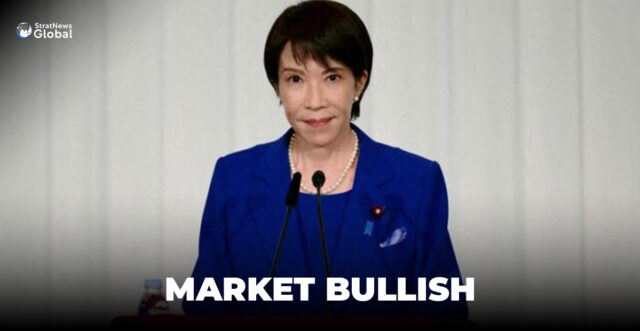On Monday, hopes rose that hardline conservative Sanae Takaichi could become Japan’s first female prime minister, as support from the right-wing opposition Japan Innovation Party, or Ishin, helped lift Tokyo stocks to a record high.
Ishin lawmakers are set to meet at 2 p.m. (0500 GMT) to discuss forming a coalition with the ruling Liberal Democratic Party (LDP), followed by talks between Takaichi and Ishin leaders Fumitake Fujita and Osaka Governor Hirofumi Yoshimura, where the alliance is expected to be finalised.
Japanese media reported that the parties had agreed to an alliance behind closed doors but an official announcement would follow the meeting.
“The relationship of trust is deepening substantially, and I believe that’s what the other party is thinking,” Fujita said on Sunday after senior party officials met.
Japan’s blue-chip Nikkei share index jumped more than 2% in early trading.
New Partners
A cooperation agreement would deliver a combined 231 seats in parliament’s dominant lower house. It would fall two short of a majority, but ensure Takaichi likely wins a vote in parliament tomorrow to pick Japan’s next prime minister. She will only need a majority of ballots cast rather than of all members in any runoff vote.
To govern, however, she will still need to court the support of other opposition groups, including for an upcoming supplementary budget.
The expected deal with Ishin follows the collapse of the LDP’s 26-year coalition with Komeito, which ended its alliance after the ruling party picked Takaichi as its new leader.
Komeito’s abrupt withdrawal triggered talks among opposition parties, including the second largest Ishin, that could have derailed her premiership ambitions and thrown her party out of power for the first time in more than a decade. Ishin’s decision to side with the LDP ends that possibility.
Fiscal Dove, Security Hawk
Takaichi, a fiscal dove, has called for higher spending and tax cuts to cushion consumers from rising inflation and has criticized the Bank of Japan’s decision to raise interest rates.
“Expectations for Takaichi’s economic policies, which include fiscal expansion and monetary easing, appear to be facilitating rising share prices and a weaker yen,” said Nomura Securities strategist Fumika Shimizu.
Some analysts say Ishin, which advocates for small government and spending cuts, could restrain some of Takaichi’s spending ambitions.
Takaichi wants to revise Japan’s pacifist postwar constitution to recognize the role of its military. A regular visitor to the Yasukuni war shrine in Tokyo, viewed by some Asian neighbours as a symbol of wartime aggression, she wants higher defence spending to deter neighbouring China.
She has also called for stricter immigration rules and opposes social policies, such as allowing women to retain their surnames after marriage, which she says undermine traditional values.
(With inputs from Reuters)





